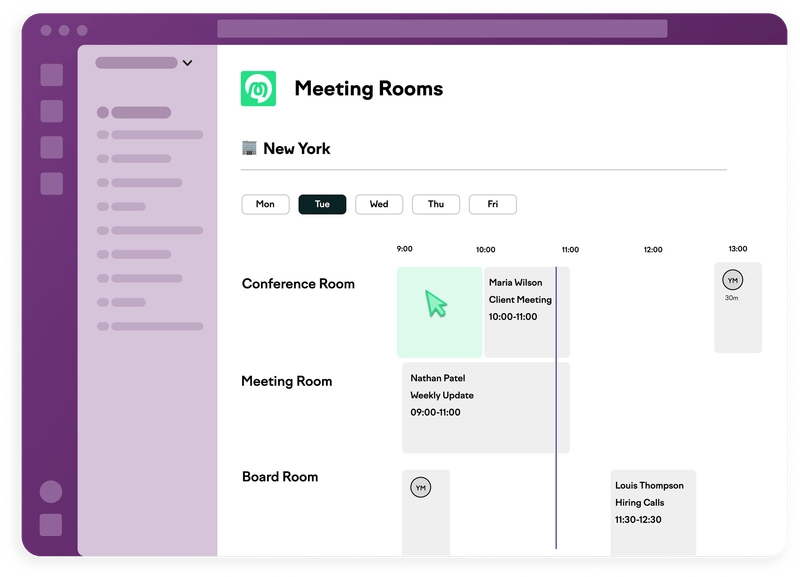
Discover more about Flexible Work Enablement
Read more about flexible work enablement
Read more

Discover more about Flexible Work Enablement
Read more about flexible work enablement
Read more
Say goodbye to complicated software or messy spreadsheets.
Manage your desks, meeting rooms and car parking all from Slack and Teams.

No credit card required

Free to test with your team

.webp)

.webp)
.webp)
.webp)



.webp)

.webp)
.webp)
.webp)



.webp)

.webp)
.webp)
.webp)


No More Desk Booking Chaos
Still managing bookings with Excel and Slack or Teams threads? It’s a daily mess—missed reservations, squatting, and “is anyone in today?” messages at 8am.
Officely automates it. One-click booking, daily check-ins, and full visibility—inside Slack or Teams. Desks get used. Chaos disappears. You stop firefighting.
-p-800.webp)

Don’t let your office go to waste
Usage data that justifies every decision.
You’re asked to reduce office space. But you’re running blind.
Officely shows you who booked, who showed up, and what’s underused. Back every office decision with real numbers.
Double-Booked Rooms? Fixed.
Manage meeting spaces directly in Teams and Slack.
Outlook calendars don’t cut it. Teams show up to “reserved” rooms that aren’t—and blame you.
Meeting Rooms by Officely shows live availability, simplifies booking, and reduces no-shows. You stay out of the drama. Meetings run on time.


Know Who’s In. At a Glance.
Real-time attendance. No detective work.
You shouldn’t have to message around to figure out who’s coming in.
Officely gives you instant visibility via daily prompts and live check-ins. Now you can plan cleaning, catering, and culture—with zero guesswork.
Track Policy Compliance Automatically
Managers hate being the office police. Hybrid rules slip because no one checks them consistently. You feel pressure from leadership but lack reliable proof.
Officely logs attendance in Slack/Teams, allowing you to compare it to your policy. Compliance gaps surface instantly. No chasing managers, no awkward conversations.
.avif)

All in Slack and Teams—because simplicity wins
Why make your team download another app they’ll ignore? Our apps live in Slack and Teams, so your team can manage their office life without skipping a beat. It’s easy, it’s familiar, and it’s built for adoption.
Trusted by 500+ companies and rated 4.6/5 on G2, Officely helps over 15,000 employees stay connected and make hybrid work effortless every month.


Coordinate in-office days effortlessly. Officely helps teams plan their week, see who’s in, and make every office day intentional.
Officely lives inside Slack and Microsoft Teams, so your teammates can book desks, share plans, and feel connected — without switching tools.
Get full visibility into office usage and attendance patterns. Identify trends, optimise space, and make informed hybrid decisions.
Reduce wasted office space and make the most of every desk. Officely helps you right-size your workspace and cut costs — without hurting culture.
Rated by 100+ companies, Officely is one of the top-reviewed hybrid work tools helping over 15,000 employees stay connected every month.
Monthly
Annual
SAVE UP TO 20%
For up to 5 users.
All the features, only 5 employees.
Perfect to test Officely with a small team.
Free TrialRECOMMENDED
per user/per month
Everything Officely offers, with unlimited users.
Boost office attendance and bring your in-person culture to life.
Try it Freeper user/per month
Simple desk booking with unlimited users.
Manage office capacity with a tool your team will actually use.
Free TrialFor up to 5 users.
All the features, only 5 employees.
Perfect to test Officely with a small team.
Free TrialRECOMMENDED
per user/per month
Everything Officely offers, with unlimited users.
Boost office attendance and bring your in-person culture to life.
Try it Freeper user/per month
Simple desk booking with unlimited users.
Manage office capacity with a tool your team will actually use.
Free TrialFor up to 5 users.
All the features, only 5 employees.
Perfect to test Officely with a small team.
Free TrialRECOMMENDED
per user/per month
Everything Officely offers, with unlimited users.
Boost office attendance and bring your in-person culture to life.
Try it Freeper user/per month
Simple desk booking with unlimited users.
Manage office capacity with a tool your team will actually use.
Free TrialFor up to 5 users.
All the features, only 5 employees.
Perfect to test Officely with a small team.
Free TrialRECOMMENDED
per user/per month
Everything Officely offers, with unlimited users.
Boost office attendance and bring your in-person culture to life.
Try it Freeper user/per month
Simple desk booking with unlimited users.
Manage office capacity with a tool your team will actually use.
Free TrialFor up to 5 users.
All the features, only 5 employees.
Perfect to test Officely with a small team.
Free TrialRECOMMENDED
per user/per month
Everything Officely offers, with unlimited users.
Boost office attendance and bring your in-person culture to life.
Try it Freeper user/per month
Simple desk booking with unlimited users.
Manage office capacity with a tool your team will actually use.
Free TrialLearn how Cloudtalk uses Officely to encourage office use, without having to mandate fixed office days.
“For us, the most valuable feature of Officely is that it shows people what they’re missing out on."

Ready to bring your office back to life?
Add Officely to Slack or Teams for free today.